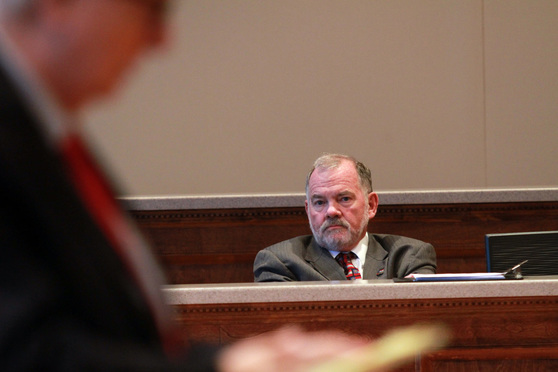After Theft Plea, Superior Court Judge Mack Crawford Is Still on the Bench
Pike County Superior Court Judge Robert M. "Mack" Crawford collected his judicial salary and benefits for two years while fighting felony criminal charges and a recommendation by the state's judicial watchdog agency that he be removed from the bench.
February 19, 2020 at 03:29 PM
5 minute read
 Pike County Superior Court Judge Robert "Mack" Crawford at his JQC hearing in February 2019 (Photo: John Disney/ ALM)
Pike County Superior Court Judge Robert "Mack" Crawford at his JQC hearing in February 2019 (Photo: John Disney/ ALM)
Nearly two weeks after beginning a probationary sentence for misdemeanor theft, Judge Robert "Mack" Crawford remains on the Pike County Superior Court bench.
The judge's plea deal with the state attorney general reducing felony charges to a single misdemeanor offense for the theft of $15,675 in unclaimed court registry funds required he submit a letter of resignation the day of his Feb. 6 plea.
Crawford submitted two resignation letters. The first, dated Feb. 6, didn't specify a departure date but was contingent on the governor's acceptance.
Crawford said he submitted a second letter on Feb. 10 at the request of the governor's staff, making his resignation effective March 1, to coincide with his retirement as a state employee.
Crawford said he received Kemp's letter accepting his March 1 resignation on Tuesday. Kemp's letter was dated Feb. 12.
A spokeswoman for Attorney General Chris Carr and Assistant Attorney General Greg Lohmeier, who prosecuted Crawford, declined to comment.
Kemp's acceptance of Crawford's March 1 resignation gives the judge three more weeks of judicial pay and benefits as he begins 12 months of unsupervised probation.
The base salary for the state's superior court judges is $126,265, according to the Association of County Commissioners of Georgia.
The additional wages, despite a condition of Crawford's plea requiring that he resign and not serve as a judge while on probation, is on top of 22 months of full pay and benefits Crawford accrued after the JQC and the Georgia Bureau of Investigation opened separate investigations into the theft of the registry funds in early 2018.
Crawford recused from most of his cases in March 2018, and the JQC suspended him twice with pay while the criminal and ethics investigations were pending.
Crawford repaid the funds he was accused of stealing in 2018, saying he did so because he was misled into thinking that repaying the money would close the matter. He and his attorneys insist the funds—which were deposited in the court registry in 2002 for a former client—were owed to him as legal fees.
Meanwhile, Crawford's state pension vested last June after he appealed the JQC's recommendation in April to remove him from the bench.
The Supreme Court of Georgia's decision last July to table a decision on whether to remove Crawford enabled the judge to qualify for a 2% cost of living increase last summer.
The high court tabled the matter until the state Court of Appeals decides whether JQC members are legally appointed. A Cobb County trial judge ruled last March that they were, but Crawford has appealed that decision.
Meanwhile, Crawford's three colleagues in the Griffin Circuit had little choice but to pick up his caseload. The Georgia General Assembly created a fifth judgeship in the circuit last year, and Kemp appointed circuit district attorney Benjamin Coker to that post last Friday.
Crawford's suspension expired last fall, and he quietly returned to the bench, even though he still faced felony charges and a pending recommendation that he be removed from office for violating the state judicial ethics code.
Under JQC rules, if a suspended judge indicted on felony charges is not tried at the next term following the indictment, the suspension is terminated and the judge reinstated.
Crawford said he signed orders in several consent divorce cases before the circuit's chief superior court judge, Christopher Edwards, directed court clerks to reassign Crawford's cases to the circuit's fifth judge, who was not yet appointed.
Edwards was on vacation and couldn't be reached for comment.
Crawford said he spent part of Friday in his chambers with clerical staff "going through files we had in the office," returning exhibits to attorneys that were not admitted as evidence in now closed cases, and destroying personal notes he "used to make decisions" on cases that "have been closed for a long time."
Ben Easterlin, the JQC's executive director until his retirement in December, said he has ethical concerns about Crawford's continued access to court files and court personnel, now that he's on probation.
"Any continuing activity with the files at this time reflects a disregard for the authority of the JQC and the integrity of the judicial system," Easterlin said.
Crawford said he was not violating the terms of his 12-month, unsupervised probation, even though it requires that, in addition to resigning, he can't apply for, run for or serve as a judge while on probation.
"I haven't done anything as a judge," he said. "I know better than that."
Crawford's counsel, Zebulon attorney Virgil Brown, said he recommended that Crawford take sick leave rather than return to the bench. But, he said, once Crawford's suspension expired, "He could have handled anything he wanted to. … He had a legal right to do it."
This content has been archived. It is available through our partners, LexisNexis® and Bloomberg Law.
To view this content, please continue to their sites.
Not a Lexis Subscriber?
Subscribe Now
Not a Bloomberg Law Subscriber?
Subscribe Now
NOT FOR REPRINT
© 2025 ALM Global, LLC, All Rights Reserved. Request academic re-use from www.copyright.com. All other uses, submit a request to [email protected]. For more information visit Asset & Logo Licensing.
You Might Like
View All
Georgia Republicans Push to Limit Lawsuits. But Would That Keep Insurance Rates From Rising?
5 minute read
A Plan Is Brewing to Limit Big-Dollar Suits in Georgia—and Lawyers Have Mixed Feelings
10 minute readTrending Stories
- 1Data Breaches in UK Legal Sector Surge, According to ICO Data
- 2PayPal Faces New Round of Claims; This Time Alleging Its 'Honey' Browser Extension Cheated Consumers
- 3Fired NLRB Member Seeks Reinstatement, Challenges President's Removal Power
- 4NY Inspector General Announces Attorneys Hired to Lead Upstate Region and Gaming
- 5Carol-Lisa Phillips to Rise to Broward Chief Judge as Jack Tuter Weighs Next Move
Who Got The Work
J. Brugh Lower of Gibbons has entered an appearance for industrial equipment supplier Devco Corporation in a pending trademark infringement lawsuit. The suit, accusing the defendant of selling knock-off Graco products, was filed Dec. 18 in New Jersey District Court by Rivkin Radler on behalf of Graco Inc. and Graco Minnesota. The case, assigned to U.S. District Judge Zahid N. Quraishi, is 3:24-cv-11294, Graco Inc. et al v. Devco Corporation.
Who Got The Work
Rebecca Maller-Stein and Kent A. Yalowitz of Arnold & Porter Kaye Scholer have entered their appearances for Hanaco Venture Capital and its executives, Lior Prosor and David Frankel, in a pending securities lawsuit. The action, filed on Dec. 24 in New York Southern District Court by Zell, Aron & Co. on behalf of Goldeneye Advisors, accuses the defendants of negligently and fraudulently managing the plaintiff's $1 million investment. The case, assigned to U.S. District Judge Vernon S. Broderick, is 1:24-cv-09918, Goldeneye Advisors, LLC v. Hanaco Venture Capital, Ltd. et al.
Who Got The Work
Attorneys from A&O Shearman has stepped in as defense counsel for Toronto-Dominion Bank and other defendants in a pending securities class action. The suit, filed Dec. 11 in New York Southern District Court by Bleichmar Fonti & Auld, accuses the defendants of concealing the bank's 'pervasive' deficiencies in regards to its compliance with the Bank Secrecy Act and the quality of its anti-money laundering controls. The case, assigned to U.S. District Judge Arun Subramanian, is 1:24-cv-09445, Gonzalez v. The Toronto-Dominion Bank et al.
Who Got The Work
Crown Castle International, a Pennsylvania company providing shared communications infrastructure, has turned to Luke D. Wolf of Gordon Rees Scully Mansukhani to fend off a pending breach-of-contract lawsuit. The court action, filed Nov. 25 in Michigan Eastern District Court by Hooper Hathaway PC on behalf of The Town Residences LLC, accuses Crown Castle of failing to transfer approximately $30,000 in utility payments from T-Mobile in breach of a roof-top lease and assignment agreement. The case, assigned to U.S. District Judge Susan K. Declercq, is 2:24-cv-13131, The Town Residences LLC v. T-Mobile US, Inc. et al.
Who Got The Work
Wilfred P. Coronato and Daniel M. Schwartz of McCarter & English have stepped in as defense counsel to Electrolux Home Products Inc. in a pending product liability lawsuit. The court action, filed Nov. 26 in New York Eastern District Court by Poulos Lopiccolo PC and Nagel Rice LLP on behalf of David Stern, alleges that the defendant's refrigerators’ drawers and shelving repeatedly break and fall apart within months after purchase. The case, assigned to U.S. District Judge Joan M. Azrack, is 2:24-cv-08204, Stern v. Electrolux Home Products, Inc.
Featured Firms
Law Offices of Gary Martin Hays & Associates, P.C.
(470) 294-1674
Law Offices of Mark E. Salomone
(857) 444-6468
Smith & Hassler
(713) 739-1250








